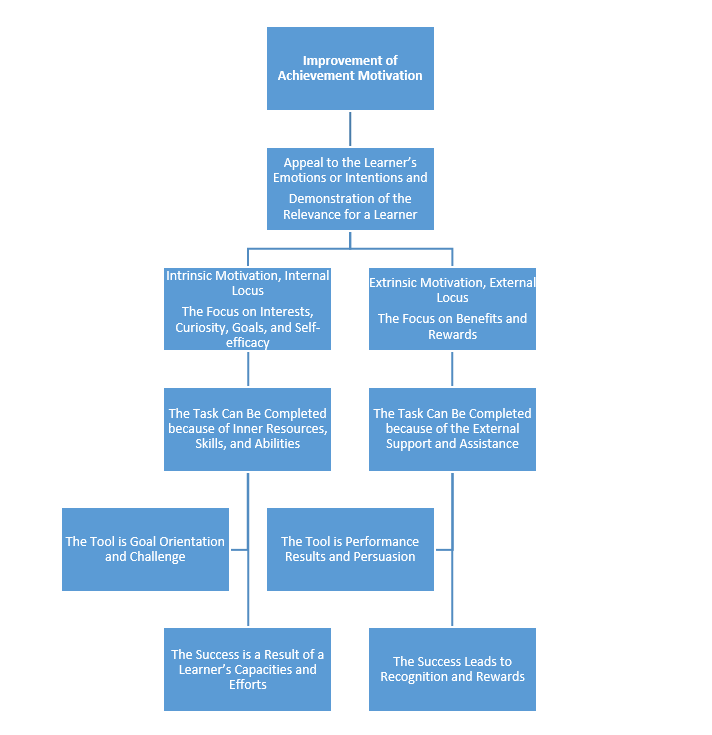Discussion of Scores
The scores on the Achievement Motivation Scale demonstrate how a learner is motivated to achieve higher results and take efforts to complete tasks. If the score is low or moderately low, a learner generally has no need for achievement, or he is not motivated to achieve higher results in activities. In this case, the problems with academic performance can be observed. To make a student-oriented to achievements, it is necessary to make this achievement attractive, necessary, or interesting for a student, depending on the intrinsic or extrinsic motivation and internal or external locus of control. High scores on the scale are associated with high academic performance results because of students’ orientation to achieve more.
The score on the Rotter Locus of Control scale is important to demonstrate whether learners discuss themselves as controlling situations and their activities or not. People with the external locus of control experience problems in learning because they do not believe in their role in influencing their results. People with the internal locus of control feel responsible for the actions and performance results. Students need to develop an internal locus of control to succeed in studying.
Improvement of Achievement Motivation
Achievement motivation in students is associated with their locus of control and dependence on intrinsic or extrinsic motivators. The main principle that should be followed by an educator in order to influence the achievement motivation of students is the focus on their motivation and vision of their own abilities to achieve results (Tollefson 64). In this context, an instructor needs to use a variety of strategies and approaches in order to motivate each student (Vansteenkiste, Lens, and Deci 22). In order to help students improve and develop their achievement motivation, it is necessary to propose learners the instruction and teaching methods and tools that are correlated with their motivation.
The sources of the achievement motivation are similar to the sources of any motivation in a person, and depending on the intrinsic or extrinsic factors, learners can be motivated to increase their need for achievement and success through interest, challenge, goals, and self‐efficacy beliefs. However, the approach using the listed aspects is working mostly for learners with intrinsic motivation and the internal locus of control (Vansteenkiste, Lens, and Deci 22). The learners with the developed extrinsic motivation and external locus of control need to understand the role of the social impact in the process in order to develop their need for excellence.
Focusing on the motivational theories, it is possible to develop the path to improve the learners’ achievement motivation that can have the steps that apply to different learners with various levels of achievement motivation development. The proposed steps to improve motivation are the following ones:

Works Cited
Tollefson, Nona. “Classroom Applications of Cognitive Theories of Motivation”. Educational Psychology Review 12.1 (2000): 63-83. Print.
Vansteenkiste, Maarten, Willy Lens, and Edward Deci. “Intrinsic Versus Extrinsic Goal Contents In Self-Determination Theory: Another Look At The Quality Of Academic Motivation”. Educational Psychologist 41.1 (2006): 19-31. Print.